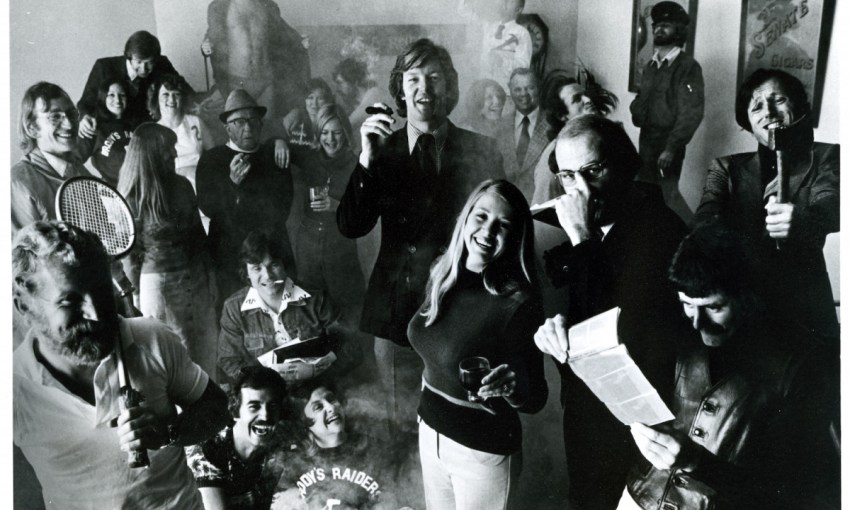In the May issue of SALIFE, out now, we take a look back at Adelaide’s advertising industry, circa the 1960s-’80s, when flared trousers, long lunches and catchy jingles ruled.
Meet Adelaide’s Mad Men
Some of Adelaide’s most iconic ads from the 1960s, ’70s and ’80s have been seared into our collective psyche – for those of us old enough to remember.
Stick-in-your head jingles and cheesy slogans form part of our South Australian cultural history, transporting us back to a time and place when Adelaide was a thriving hub of industry, infrastructure and inventiveness.
It’s an Adelaide reflected in the TV commercial for Don Dunstan’s 1977 election campaign, showing the legendary pollie chatting to constituents on a local beach, while the jingle told us to “Thank the Lord for South Australia”.
Adelaide advertising of the ’70s and ’80s reflected a moment in time here – when Adelaide Festival Centre and Hajek Plaza were sparkling new, when teenagers met at Downtown in Hindley Street for some good, clean fun, and Mr Juicy made “the rockin’ world go round”.
And who remembers the State Bank commercial, sung by a local icon himself Keith Conlon, reminding us that “they don’t have fritz in Sydney, and they’ve never tried a Woodies lemonade”? These proudly South Australian commercials reflect a prosperous time, pre the State bank collapse, when business boomed and advertising campaigns were fiercely fought over.
In our SALIFE cover story this month, Adelaide’s Mad Men, we meet some of the creative executives who were at the heart of the advertising industry in its heyday; the major players who wheeled and dealed in an era where long lunches turned into early dinners.
One of the most successful ad men back in the day was Andrew Killey, who started out as a junior and ended up co-owning one of the state’s most successful agencies, KWP! Killey is the man behind the Snappy Tom jingle, “The cats of Australia have made their choice”.
Reflecting on his early days in the advertising world, Killey says the long lunch has been “much maligned”.
“It was actually a very smart business tool,” he says. “There are times when you can see in a client’s eyes that they can’t say what they mean. It’s not a bad thing to say, ‘what are you doing for the next hour?’ Let’s have a bite to eat and a chat’. Have a beer or a bottle of wine; two bottles of wine. Then it starts to come out.
“They want to talk about it to someone and explain their situation, so there is a bit of the father confessor in good advertising people, you’ve got to listen. I used to always say to staff, you’ve got two jobs, to make the client’s product sell and do all that, but we’ve got to make our client look great. And the greater we can make him or her look, the better results we can get, the more loyalty and respect we’ll get and we’ll have a better relationship. I think a lot of that has been lost.”
Killey’s career included a stint at Clemenger BBDO in New York, the agency Mad Men was based on, where he worked on accounts for Pepsi and Visa in “the heyday when they were doing Michael Jackson ads and he was burning his hair”.
David Minear was another high-flier in Adelaide’s advertising golden days, starting out in the mid ’70s and working his way up to run Young & Rubicam in Adelaide.
Minear recalls some of the agency’s most successful and memorable ads, such as a West End campaign, starring singer John Swan, who told us to “live it around a West End Export”.
Another campaign Minear highlights is the memorable Mitsubishi Canter sumo commercial with the slogan, “not so squeezy”.
Minear looks back fondly at the creativity and risk-taking of his early days in the business, rather than the ads of today, which focus on “bombardment and sameness”.
“It’s like you never had a job and I don’t mean to be disrespectful,” he says. “David Niven wrote a book called The Moon is a Balloon and in the last couple of paragraphs he talks about how he lived in fear that someday someone would tap him on the shoulder and say, ‘Hey it’s about time you got a real job’. I really feel like that’s been my journey as well.
“You can’t deny there were hard times, it could be tough, and all the things you don’t want to happen in a business happened, but overall and particularly in the ’70s and ’80s, it’s was a joy.”
Read the full story of Adelaide’s iconic advertising days in the May issue of SALIFE, on sale at newsagencies and independent supermarkets now.
Alternatively, to have your own copy delivered to your door, click here.



